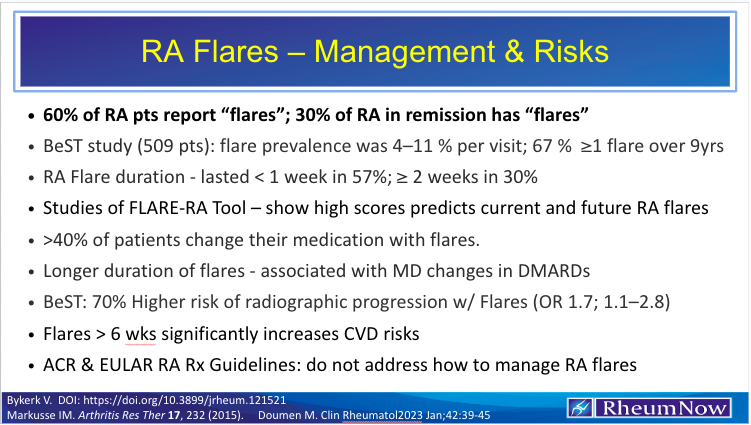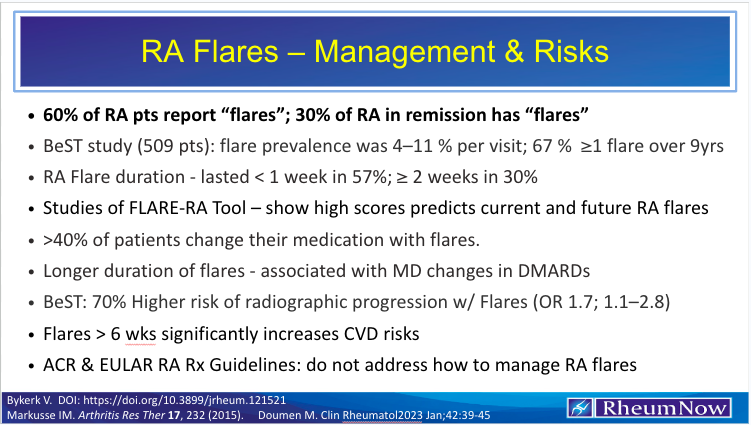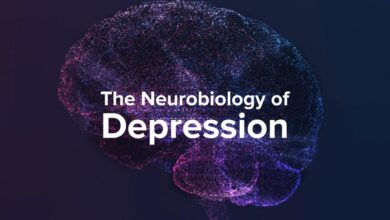
Depression and ra flare ups – Depression and RA flare-ups: a potent combination that can significantly impact daily life. This exploration delves into the intricate connection between these conditions, examining the potential biological and psychological links, and offering insights into management strategies. We’ll look at how stress and emotional states influence RA symptoms, compare and contrast symptoms, and explore the multifaceted ways these conditions affect daily routines.
Understanding the overlap in symptoms, such as fatigue, can be crucial for accurate diagnosis and effective treatment. The combined impact on physical, emotional, and social functioning is considerable, often creating a vicious cycle that needs careful attention. This article provides a comprehensive look at managing both conditions, from medication and therapy to lifestyle changes and the vital role of support systems.
Understanding the Connection

The intricate relationship between depression and rheumatoid arthritis (RA) flare-ups is a complex interplay of biological and psychological factors. While seemingly disparate conditions, a shared pathway of inflammation, stress, and the body’s response to these stressors often connects them. This article delves into the potential link between these two conditions, exploring the mechanisms behind their correlation and the impact of emotional states on RA symptoms.
Potential Biological Mechanisms
The immune system plays a critical role in both depression and RA. In RA, the immune system mistakenly attacks the body’s own tissues, leading to inflammation and joint pain. This chronic inflammatory process can have cascading effects on the body, potentially contributing to the development or exacerbation of depression. Conversely, depression has been linked to alterations in the brain’s neurochemical balance, impacting the immune response.
This disruption could contribute to the activation or worsening of the inflammatory process in RA. Furthermore, research suggests a possible role for cytokines, signaling molecules involved in inflammation, in both conditions. Increased levels of pro-inflammatory cytokines, such as TNF-alpha, may contribute to both the symptoms of RA and the development of depressive symptoms.
Potential Psychological Mechanisms
Stress is a significant factor in both depression and RA flare-ups. Chronic stress can trigger the release of stress hormones, such as cortisol, which can exacerbate inflammation. This heightened inflammatory response can lead to increased pain and stiffness in RA, triggering or worsening a flare-up. Additionally, the psychological impact of managing a chronic illness like RA can contribute to feelings of hopelessness, helplessness, and isolation, potentially leading to depression.
Conversely, the emotional distress associated with depression can negatively affect RA symptoms. The negative emotions associated with depression can lead to increased stress, which in turn can worsen inflammation and trigger RA flare-ups.
Impact of Stress and Emotional States on RA Symptoms
Stress and emotional states can significantly impact RA symptoms. For example, a stressful event or period of intense emotional distress can precipitate a RA flare-up, manifesting as increased joint pain, swelling, and stiffness. Similarly, feelings of hopelessness or despair can contribute to the worsening of RA symptoms. Conversely, positive emotional states and stress management techniques can help mitigate the severity and frequency of RA flare-ups.
These techniques can reduce the release of stress hormones and support a more balanced immune response.
Comparison of Depression and RA Flare-up Symptoms
| Symptom | Depression | RA Flare-up | Overlapping Symptoms |
|---|---|---|---|
| Fatigue | Yes | Yes | Yes |
| Loss of Interest | Yes | Potentially | Potentially |
| Changes in Sleep Patterns | Yes | Yes | Yes |
| Changes in Appetite | Yes | Potentially | Potentially |
| Low Mood | Yes | Potentially | Potentially |
| Pain | Potentially | Yes | Yes |
| Inflammation | Potentially | Yes | Yes |
The table above highlights some overlapping and distinct characteristics between depression and RA flare-ups. While both conditions can present with fatigue and sleep disturbances, RA flare-ups are characterized by specific physical symptoms like joint pain and inflammation, while depression primarily involves emotional symptoms. However, there are potential overlaps, as chronic pain and inflammation can contribute to depressive symptoms, and the emotional distress of depression can exacerbate RA symptoms.
Impact on Daily Life: Depression And Ra Flare Ups
Living with both depression and rheumatoid arthritis (RA) can significantly impact daily life, creating a complex interplay of challenges. The physical limitations imposed by RA flare-ups often intersect with the emotional and mental struggles of depression, leading to a vicious cycle of reduced functionality and well-being. Understanding these interconnected impacts is crucial for developing effective coping strategies and support systems.
Dealing with depression and rheumatoid arthritis (RA) flare-ups can be tough, especially when you’re juggling other health concerns. It’s important to remember that various factors can impact your overall well-being. For example, some breast cancer treatments, like those aggressive chemotherapy regimens, can increase the risk of heart disease, a complication that needs careful monitoring alongside managing RA and depression.
This underscores the interconnectedness of health issues and the importance of open communication with your medical team to develop a holistic treatment plan that considers all aspects of your health. Ultimately, understanding these complexities can help you better navigate the journey of managing depression and RA flare-ups.
Daily Activities and Routines
Depression and RA flare-ups can disrupt virtually all aspects of daily life. Simple tasks that most people take for granted, such as getting dressed, preparing meals, or engaging in household chores, can become overwhelming and impossible to manage. The fatigue, pain, and emotional distress associated with these conditions can make even the smallest activities feel monumental. This can lead to feelings of isolation and powerlessness, further exacerbating the existing mental health issues.
Impact on Managing Daily Tasks
The ability to manage daily tasks is often severely compromised. Basic hygiene routines, like showering or brushing teeth, can become challenging due to pain and fatigue. Preparing meals, even simple ones, can be difficult when physical energy is low or the desire to engage in the activity is absent. The emotional component of depression can further hinder motivation, making it even harder to complete necessary tasks.
Impact on Work and Employment
Work productivity can plummet during periods of depression and RA flare-ups. Consistent absenteeism, reduced concentration, and difficulty completing tasks are common. The fear of judgment, the pressure to perform, and the physical limitations associated with RA can contribute to feelings of inadequacy and anxiety at work. This can lead to job loss, financial strain, and a decrease in self-esteem.
Impact on Social Interactions, Depression and ra flare ups
Social interactions can be significantly affected. The lack of energy and motivation to socialize can lead to feelings of isolation and loneliness. The pain and stiffness associated with RA flare-ups can make attending social events and maintaining relationships difficult. Depression can further compound these challenges, resulting in feelings of social withdrawal and avoidance.
Dealing with depression and rheumatoid arthritis flare-ups can be tough, impacting everything from mood to physical comfort. Sometimes, even the smallest things, like trying to grow out your eyebrows, can feel like a monumental task. Finding helpful resources like how to grow out eyebrows can be a distraction and a boost to self-care, which can indirectly help manage the overall emotional and physical toll of RA flare-ups and the accompanying depression.
Focusing on these small self-care steps can be a vital part of the journey toward feeling better, both inside and out.
Potential Impact on Various Aspects of Life
| Aspect of Life | Impact of Depression | Impact of RA Flare-up | Combined Impact |
|---|---|---|---|
| Physical Activity | Decreased energy, motivation, and reduced drive to exercise | Pain, stiffness, reduced mobility, and difficulty with movement | Significant limitations in physical activity and reduced overall functioning |
| Daily Tasks | Lack of motivation, difficulty initiating tasks | Pain, fatigue, and physical limitations | Significant delays and difficulty in completing daily tasks |
| Work/Employment | Reduced concentration, absenteeism, difficulty meeting deadlines | Missed work due to pain, stiffness, and fatigue | Reduced productivity, potential job loss, and financial strain |
| Social Interactions | Social withdrawal, difficulty initiating conversations, and a sense of isolation | Pain, fatigue, and difficulty attending social events | Significant isolation, difficulty maintaining relationships, and decreased social engagement |
| Emotional Well-being | Increased feelings of hopelessness, worthlessness, and despair | Increased pain and discomfort, leading to irritability and frustration | Increased risk of developing anxiety, panic attacks, and heightened emotional distress |
The Vicious Cycle
The impacts of depression and RA flare-ups can create a vicious cycle. For example, a flare-up can lead to increased pain and fatigue, which in turn reduces motivation and energy levels, contributing to feelings of depression. This depression, in turn, can further exacerbate physical symptoms, leading to a more severe flare-up, and so on. Breaking this cycle requires proactive management of both conditions, including medication, therapy, lifestyle adjustments, and a strong support system.
Management Strategies
Navigating both depression and rheumatoid arthritis (RA) flare-ups requires a multifaceted approach that considers the intricate interplay between mental and physical well-being. Effective management involves a combination of strategies, from medication and therapy to lifestyle adjustments and supportive relationships. Understanding these strategies is crucial for individuals facing these challenges.Effective management of both conditions requires a proactive and holistic approach.
It’s important to remember that each individual’s experience is unique, and tailored strategies are essential for optimal outcomes. Success relies on consistent effort, open communication with healthcare providers, and a commitment to personal well-being.
Medication Management
Medication plays a critical role in managing both depression and RA. A comprehensive approach to medication management involves careful consideration of potential side effects and interactions. The table below Artikels common treatments for both conditions. Medication selection should be guided by a physician specializing in both conditions.
| Treatment Type | Depression Treatment | RA Treatment |
|---|---|---|
| Medication | Selective serotonin reuptake inhibitors (SSRIs), serotonin-norepinephrine reuptake inhibitors (SNRIs), tricyclic antidepressants (TCAs), or other antidepressants as directed by a psychiatrist | Nonsteroidal anti-inflammatory drugs (NSAIDs), disease-modifying antirheumatic drugs (DMARDs), corticosteroids, or biologics as determined by a rheumatologist. |
| Dosage and Timing | Individualized dosages based on the severity of depression, potential side effects, and patient response. Consistency in timing is often beneficial. | Dosage and frequency of administration vary significantly depending on the medication and the severity of the flare-up. Strict adherence to the prescribed schedule is crucial. |
| Monitoring | Regular monitoring for side effects and efficacy is essential. This may involve frequent check-ins with a mental health professional. | Regular blood tests and assessments of inflammation levels are vital to monitor the effectiveness of treatment and potential side effects. |
Therapy and Support Systems
Therapy provides a crucial avenue for managing both depression and RA. Cognitive Behavioral Therapy (CBT) and other therapeutic approaches can help individuals develop coping mechanisms and strategies for managing symptoms and associated emotional distress. Building a strong support system is equally important.
- Cognitive Behavioral Therapy (CBT): CBT helps patients identify and challenge negative thought patterns and behaviors associated with depression. This can be especially beneficial in managing the emotional distress that accompanies RA flare-ups.
- Support Groups: Connecting with others who share similar experiences can provide invaluable emotional support and practical advice. Online or in-person groups can be helpful. Sharing experiences and finding solutions in a group setting can be a powerful tool.
- Family and Friends: Enlisting the support of loved ones can provide emotional comfort and practical assistance during periods of illness. Open communication and understanding are essential.
Lifestyle Changes
Adopting healthy lifestyle choices is crucial in managing both depression and RA. This includes dietary adjustments, exercise, and stress management techniques. A balanced approach, combining these elements, can significantly improve overall well-being.
- Diet: A balanced diet rich in fruits, vegetables, and whole grains can contribute to overall health and well-being. Avoiding processed foods and excessive sugar intake is recommended. Specific dietary changes should be discussed with a nutritionist or doctor.
- Exercise: Regular physical activity, tailored to individual capabilities, can help alleviate symptoms of both conditions. This can include activities like walking, swimming, or yoga. Consult a physician before starting any new exercise program.
- Stress Management: Chronic stress can exacerbate both depression and RA symptoms. Techniques like meditation, mindfulness, and deep breathing exercises can be valuable tools for stress reduction. Consistent practice can significantly improve coping mechanisms.
Flowchart for Effective Management
The following flowchart Artikels a practical approach to managing both depression and RA flare-ups.
Dealing with depression and RA flare-ups can be tough, especially when juggling the demands of caring for others. Finding support systems is key, and one great resource for foster parents is checking out some of the best foster parent blogs. For example, best foster parent blogs offer a wealth of advice and stories from those who understand the unique challenges.
Ultimately, connecting with others facing similar struggles can help navigate these difficult times and provide a much-needed sense of community when dealing with depression and RA flare-ups.
Support and Resources
Navigating depression and rheumatoid arthritis (RA) flare-ups can feel isolating. However, a strong support network is crucial for managing these conditions effectively. It’s not just about having people around; it’s about fostering relationships that provide understanding, practical help, and emotional support. This support system can significantly impact both mental well-being and physical recovery.A supportive environment reduces feelings of loneliness and isolation, which are often significant contributors to the severity of both depression and RA flare-ups.
This support can manifest in many ways, from listening ears to practical assistance with daily tasks. Strong connections can foster resilience and encourage healthy coping mechanisms.
Significance of Support Networks
Strong support networks are vital for individuals facing depression and RA flare-ups. These networks offer a crucial buffer against the negative impacts of these conditions. A network of understanding individuals can provide a sense of belonging and validation, which is often lacking during periods of illness. This, in turn, can help improve overall mental health and reduce the intensity of symptoms.
Role of Family and Friends
Family and friends play a critical role in providing support. Their understanding and empathy can significantly ease the burden of managing both depression and RA flare-ups. Practical assistance, such as help with household chores or transportation, can be invaluable. Encouragement and reassurance from loved ones are also essential for maintaining a positive outlook. It’s important to communicate openly about needs and limitations, allowing family and friends to offer appropriate support.
For example, a friend might offer to drive to appointments, while a family member might help with meal preparation.
Role of Support Groups
Support groups provide a unique platform for connection and shared experience. Individuals can relate to others who understand the challenges of living with both depression and RA flare-ups. Sharing stories and coping strategies can foster a sense of community and resilience. Support groups offer a safe space to discuss concerns and receive encouragement from peers who have similar experiences.
Finding Support Groups, Therapists, and Helpful Organizations
Numerous resources can help individuals find support groups, therapists, and other helpful organizations. Online search engines can reveal local support groups, while healthcare providers can often offer referrals. Mental health organizations, such as the National Alliance on Mental Illness (NAMI) or the Depression and Bipolar Support Alliance (DBSA), provide valuable information and support resources. Local community centers and hospitals may also have support groups or referral services.
- Online Support Forums: Websites and online forums dedicated to specific health conditions often have dedicated support groups. This allows individuals to connect with others experiencing similar struggles in a virtual space.
- Mental Health Professionals: Therapists and counselors specializing in mental health conditions can offer individual and group therapy to address both depression and RA. They can provide guidance and strategies for managing symptoms and building coping skills.
- Rheumatoid Arthritis Organizations: Organizations dedicated to RA, like the Arthritis Foundation, offer support groups, educational resources, and advocacy for individuals with the condition.
Building and Maintaining Supportive Relationships
Building and maintaining supportive relationships requires proactive effort. Open communication and clear boundaries are essential. Expressing feelings honestly and clearly allows others to understand needs and provide appropriate support. Regular check-ins and expressing gratitude are important for maintaining strong connections.
Open Communication and Emotional Expression
Open communication is fundamental to fostering supportive relationships. Individuals should feel comfortable expressing their feelings, concerns, and needs without fear of judgment. Emotional expression is a crucial aspect of mental well-being. Sharing experiences and emotions with trusted individuals can provide validation, reduce isolation, and promote healing. It’s crucial to identify healthy ways to express emotions, such as journaling, talking to a therapist, or engaging in creative outlets.
Illustrative Case Studies
Understanding the intricate link between depression and rheumatoid arthritis (RA) flare-ups requires looking at real-life examples. These case studies highlight the multifaceted nature of this connection, demonstrating how the interplay of physical pain, emotional distress, and treatment side effects can create a vicious cycle. Each case, while fictionalized for privacy, reflects the experiences of many individuals struggling with these conditions.
The complexity of these cases emphasizes the crucial need for comprehensive and individualized management strategies.
Case Study Examples
These examples illustrate the varying ways depression and RA flare-ups can intersect, emphasizing the need for holistic care.
| Case Study # | Description | Challenges Faced | Management Strategies |
|---|---|---|---|
| 1 | Sarah, a 38-year-old woman, has been diagnosed with RA for five years. She initially experienced mild symptoms but over time, the pain and stiffness intensified, impacting her mobility and daily routines. Her doctor prescribed several medications, but the side effects led to significant fatigue and nausea, compounding her existing emotional distress. As her physical symptoms worsened, she became increasingly isolated, losing interest in activities she once enjoyed. Her social life suffered, and she began experiencing episodes of severe anxiety and hopelessness, ultimately leading to a diagnosis of major depressive disorder. | Increased physical pain and stiffness, medication side effects (fatigue, nausea), social isolation, loss of interest in activities, anxiety, hopelessness, difficulty adhering to treatment plans. | A multidisciplinary approach was adopted, involving a rheumatologist, psychiatrist, and therapist. The team worked collaboratively to adjust medication regimens to minimize side effects while maintaining symptom control. Cognitive behavioral therapy (CBT) was employed to address Sarah’s negative thought patterns and develop coping mechanisms for stress. Support groups connected her with others experiencing similar challenges, fostering a sense of community and shared understanding. Regular exercise, tailored to her physical limitations, helped manage pain and improve mood. |
| 2 | Mark, a 55-year-old man, has had RA for 10 years. His condition has been managed relatively well, but a recent change in medication caused a significant increase in joint pain and stiffness. The heightened pain intensified his pre-existing feelings of worthlessness and helplessness, leading to a relapse of his previously managed depression. He found it challenging to maintain his medication schedule, feeling overwhelmed by the demands of his condition and its impact on his life. | Increased pain and stiffness due to medication changes, relapse of depression, feelings of worthlessness and helplessness, difficulty maintaining medication schedule, feeling overwhelmed by the demands of his condition. | His care team adjusted his medication regimen, focusing on minimizing side effects and maximizing pain relief. Regular check-ins with a therapist were scheduled to monitor his emotional state and provide support. The team encouraged Mark to establish a structured daily routine to help manage his symptoms and responsibilities. They explored alternative pain management techniques, such as acupuncture and mindfulness exercises, to supplement his existing treatment plan. |
| 3 | Emily, a 22-year-old college student, experienced a rapid progression of RA symptoms, impacting her ability to attend classes and participate in extracurricular activities. The significant emotional toll of this disruption and the accompanying uncertainty about her future led to feelings of despair and a worsening of her pre-existing anxiety. She struggled to concentrate and felt increasingly isolated, further exacerbating her symptoms. | Rapid progression of RA symptoms, disruption of daily life, uncertainty about the future, feelings of despair, worsening anxiety, difficulty concentrating, social isolation. | A team approach involving her rheumatologist, psychiatrist, and academic advisor was crucial. The team worked to ensure Emily received the necessary accommodations at school to support her health needs. Cognitive behavioral therapy (CBT) was used to help her manage anxiety and develop coping strategies for stress. Support groups for young adults with chronic illnesses were identified, connecting her with peers who understood her experiences. |
Wrap-Up

In conclusion, the interplay between depression and RA flare-ups is complex and requires a holistic approach to management. The connection between emotional well-being and physical health is undeniable. Recognizing the overlapping symptoms, understanding the impact on daily life, and employing effective strategies are key to navigating this challenge. Building a strong support network, seeking professional help, and adopting a proactive lifestyle are vital components of managing both conditions effectively.
The case studies highlight the individual struggles and underscore the need for personalized approaches to care. By understanding this complex interplay, we can empower individuals to navigate the challenges and live fulfilling lives.




